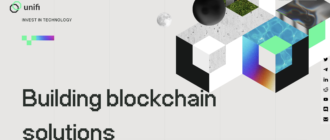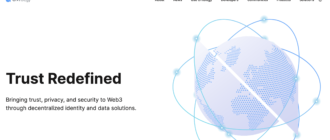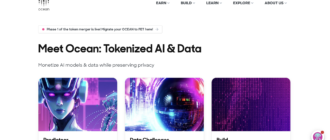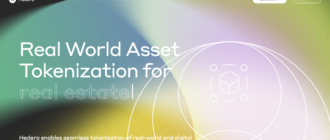This article explores Ankr, a prominent project in the blockchain and cryptocurrency landscape. We delve into various aspects of Ankr, including its history, technological framework, tokenomics, ecosystem, growth prospects, and future outlook. Ankr stands out in the Web3 infrastructure space by providing decentralized cloud computing solutions and a robust suite of services for developers and enterprises alike. Through this article, readers will gain a comprehensive understanding of Ankr’s contributions to decentralization, its innovative use cases, and the potential it holds for the future of decentralized technologies.
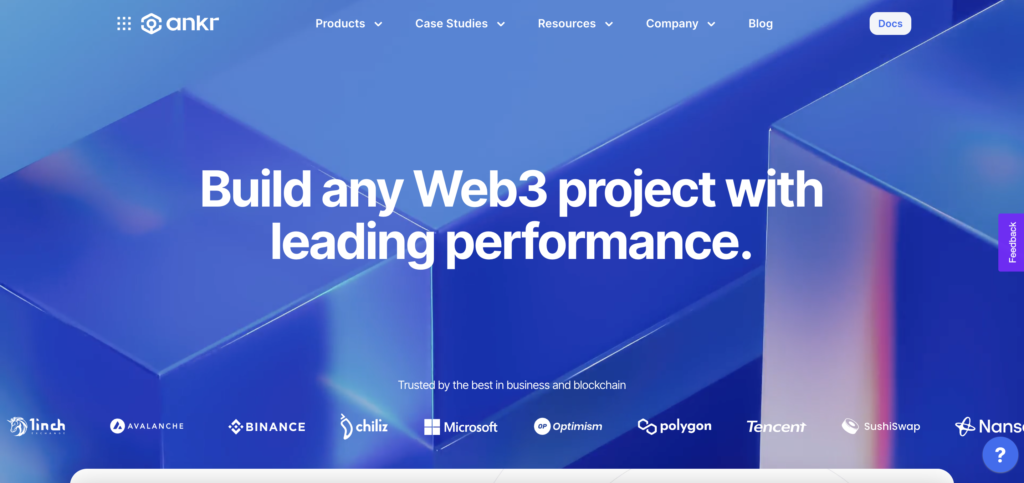
What is Ankr?
Ankr is a decentralized Web3 infrastructure platform that provides a suite of tools for developers and enterprises to build, deploy, and manage blockchain applications. It leverages the collective computing power of a global network of nodes to offer scalable, secure, and cost-effective solutions for blockchain and decentralized finance (DeFi) projects. Ankr’s core services include API and RPC endpoints, liquid staking solutions, and dedicated blockchain creation services. By eliminating the need for centralized data centers, Ankr enables significant cost savings and enhanced security, making it an attractive option for businesses seeking efficient and decentralized cloud computing solutions.
History of Ankr
Ankr was founded in 2017 with the mission to democratize access to Web3 infrastructure. Since its inception, the project has achieved several key milestones:
- 2017: Ankr was established, focusing on harnessing the power of global servers to provide decentralized infrastructure services.
- 2019: The project launched its mainnet, enabling the decentralized hosting of blockchain nodes and services.
- 2020: Ankr introduced its liquid staking solution, allowing users to stake assets and receive reward-earning tokens that can be utilized in various DeFi strategies.
- 2021: The platform expanded its offerings to include enterprise-grade infrastructure solutions, catering to the needs of large organizations and blockchain projects.
- 2022: Ankr became a key infrastructure partner for major blockchain ecosystems such as Ethereum, BNB Smart Chain, and Polygon.
- 2023: The project continued to innovate with the introduction of its Rollup-as-a-Service (RaaS) solution, simplifying the deployment of layer two scaling solutions for developers.
Ankr’s evolution reflects its commitment to enhancing the accessibility and efficiency of Web3 infrastructure, solidifying its position as a pivotal player in the decentralized technology space.
How Ankr Works
Ankr operates as a decentralized Web3 infrastructure platform that utilizes a global network of nodes to provide scalable, secure, and efficient blockchain services. The core technologies that underpin Ankr include decentralized cloud computing, blockchain technology, and remote procedure call (RPC) services. These technologies enable Ankr to offer a comprehensive suite of tools for developers and enterprises to build, deploy, and manage blockchain applications.
Key Technologies and Their Roles
- Decentralized Cloud Computing: Ankr leverages the idle computing power of network participants worldwide to create a cost-effective and efficient cloud ecosystem. This decentralized approach eliminates the need for centralized data centers, reducing operational costs and enhancing security and privacy for users. By utilizing a distributed network of nodes, Ankr can offer reliable and high-performance cloud services that compete with traditional cloud providers.
- RPC Services: Ankr’s RPC services act as gateways that facilitate communication between decentralized applications (dApps), wallets, and various blockchain networks. These services allow developers to interact with on-chain data, perform transactions, and execute smart contracts without the need to run their own nodes. Ankr’s RPC endpoints support multiple blockchains, including Ethereum, BNB Smart Chain, and Polygon, providing developers with seamless access to blockchain functionalities.
- Liquid Staking: Ankr’s liquid staking solutions enable users to stake their assets across multiple blockchains and receive reward-earning tokens in return. These tokens can be used in decentralized finance (DeFi) applications for additional earning strategies, such as liquidity mining and yield farming. This feature enhances the liquidity of staked assets, allowing users to unlock their value for other financial activities.
Unique Features and Differentiators
Ankr differentiates itself from other blockchain infrastructure providers through its extensive use of decentralized computing resources and its comprehensive suite of services. Key differentiators include:
- Decentralized Physical Infrastructure Network (DePIN): Ankr’s DePIN ensures that clients have the shortest roundtrip path for RPC requests, providing fast and reliable Web3 experiences. This network is bolstered by partnerships with major cloud providers like Tencent Cloud and Microsoft Azure, which enhance the performance and accessibility of Ankr’s services.
- Rollup as a Service (RaaS): Ankr’s RaaS offering enables businesses and developers to easily deploy layer two rollups with full customization and support from Ankr’s engineering team. This service addresses the growing need for scalable blockchain solutions, making it easier to launch high-performance rollups tailored to specific use cases.
Ankr’s Blockchain and Consensus Mechanism
Ankr does not operate its own native blockchain but provides infrastructure support for multiple existing blockchains. It utilizes a decentralized network of nodes to deliver its services, with each node operator required to stake ANKR tokens to participate. This staking mechanism ensures that nodes are maintained and synchronized with the blockchain’s current state, similar to validator penalties on networks like Ethereum.
Ankr employs a sophisticated load-balancing algorithm to manage RPC request traffic efficiently. The load balancer scores nodes based on factors such as synchronization status, geographic location, and current workload to determine the best node to handle each request. This system ensures high reliability and performance for users accessing Ankr’s services.
Tokenomics of Ankr
The Ankr token (ANKR) is a utility token that plays a crucial role within the Ankr ecosystem. It is used for various purposes including paying for services, staking, and governance. Here is an in-depth look at the tokenomics of ANKR.
Token or Coin?
ANKR is a token, not a coin. It is an ERC-20 token on the Ethereum blockchain and also operates as a BEP-20 token on the BNB Smart Chain. Unlike coins like Bitcoin or Ethereum, which have their own blockchains, tokens like ANKR rely on existing blockchain infrastructures for their operations.
Utility and Functions
ANKR serves multiple purposes within the Ankr ecosystem:
- Payment for Services: Users pay for node deployment, API access, and other services within the Ankr platform using ANKR tokens.
- Staking: ANKR tokens can be staked to earn rewards. This staking mechanism helps secure the network and allows participants to earn additional tokens as incentives.
- Governance: ANKR holders can participate in the governance of the platform by voting on proposals that affect the project’s future direction.
Emission Model
ANKR has a fixed total supply of 10 billion tokens. The distribution model is designed to ensure a healthy and sustainable ecosystem:
- Initial Distribution: ANKR tokens were distributed through a series of private and public sales during the project’s early stages.
- Circulating Supply: As of now, the entire supply of 10 billion ANKR tokens is in circulation, with no additional tokens to be minted.
- Burn Mechanism: The project incorporates a token burn mechanism to reduce the total supply over time, thereby potentially increasing the value of the remaining tokens.
Market Performance
The market performance of ANKR has seen significant fluctuations, reflecting the broader trends in the cryptocurrency market. As of the latest data, the price of ANKR hovers around $0.045 with a market capitalization of approximately $450 million. Analysts predict stable growth for ANKR, with potential price targets exceeding $0.076 in the near future due to strategic partnerships and the expansion of its service offerings.
Staking and Rewards
Staking ANKR tokens is a key component of its tokenomics. Users can stake their tokens to earn rewards and participate in network governance. This staking process not only secures the network but also incentivizes users to hold onto their tokens, thereby reducing market volatility. Rewards are distributed based on the amount staked and the duration of staking, ensuring fair compensation for network contributors.
Governance
ANKR token holders have a say in the governance of the Ankr platform. By staking their tokens, they can vote on important proposals that affect the development and direction of the project. This decentralized governance model ensures that the community has a significant role in shaping the future of Ankr.
Where to Buy ANKR
ANKR, the utility token of the Ankr network, can be purchased on several major cryptocurrency exchanges. Here are some of the key platforms where you can buy ANKR:
- Binance: Binance offers ANKR trading pairs with several cryptocurrencies including USDT and BTC. It supports both credit/debit card purchases and crypto-to-crypto transactions, making it one of the most versatile options for acquiring ANKR.
- HTX (formerly Huobi): HTX is another major exchange where ANKR is listed. It provides a range of trading pairs and allows users to purchase ANKR using various fiat currencies and cryptocurrencies.
- MEXC: MEXC offers an easy-to-use platform for buying ANKR. Users can purchase ANKR using USDT, and the exchange supports multiple payment methods, including credit cards, P2P trading, and bank transfers.
- Bybit: Bybit is known for its robust trading infrastructure and also lists ANKR. It provides competitive trading fees and supports both spot and derivatives trading for ANKR.
- KuCoin: KuCoin lists ANKR and supports a wide range of trading pairs. It offers a user-friendly interface and additional features like staking, which can be particularly useful for ANKR holders.
Where to Store ANKR
Storing your ANKR tokens securely is crucial. Here are some of the best wallet options for ANKR:
- Ledger Nano S/X: Ledger hardware wallets are among the most secure options for storing ANKR. These wallets support ERC-20 tokens like ANKR and provide robust security features, including offline storage and a secure element chip.
- Trezor: Trezor is another popular hardware wallet that supports ANKR. It offers advanced security features and an easy-to-use interface, making it a reliable choice for long-term storage.
- MetaMask: MetaMask is a widely used browser-based wallet that supports ANKR. It provides a convenient way to interact with decentralized applications (dApps) and manage your ANKR tokens directly from your web browser.
- Trust Wallet: Trust Wallet is a mobile wallet that supports multiple cryptocurrencies, including ANKR. It offers a user-friendly interface and features such as staking and easy access to DeFi platforms.
- MyEtherWallet (MEW): MEW is a web-based wallet that supports ERC-20 tokens like ANKR. It offers robust security features and integrates with hardware wallets for enhanced security.
These wallets provide a range of options depending on your needs, whether you prefer the highest security of hardware wallets or the convenience of software and mobile wallets.
Project Growth Prospects
Basis for Growth
Ankr’s growth is built on its innovative approach to providing decentralized infrastructure services. The platform leverages a global network of nodes to offer scalable, secure, and cost-effective solutions for blockchain applications. Key factors driving Ankr’s growth include:
- Technological Advancements: Ankr continually enhances its platform with new features like Rollup-as-a-Service (RaaS), advanced APIs, and liquid staking solutions. These innovations attract more developers and enterprises to the platform.
- Strategic Partnerships: Ankr has forged partnerships with leading blockchain ecosystems such as Ethereum, BNB Smart Chain, Polygon, and Avalanche. These collaborations expand Ankr’s reach and integrate its services into major blockchain networks.
- Market Demand: The increasing demand for decentralized applications (dApps) and Web3 solutions fuels Ankr’s growth. By providing essential infrastructure services, Ankr positions itself as a key enabler of the decentralized internet.
Clients and Partners
Ankr serves a diverse range of clients, from individual developers to large enterprises. Its clients include major blockchain projects and decentralized finance (DeFi) platforms. Some notable partners and clients include:
- BNB Chain: Ankr provides premium node hosting and instant access to the latest blocks.
- Chiliz: Powers Web3 applications for sports and entertainment.
- Polygon: Offers global RPC nodes, liquid staking solutions, and custom blockchain services.
- SushiSwap: Ensures multi-chain connectivity for DeFi operations.
- IoTeX: Collaborates on decentralized infrastructure projects.
Growth Forecast
Analysts predict a positive outlook for ANKR. The token is expected to experience stable growth due to ongoing technological developments and strategic market positioning. By the end of 2024, ANKR could surpass $0.076, with further potential to increase as more partnerships and use cases emerge.
Project Ecosystem
Ankr’s ecosystem is extensive, comprising various tools and services designed to support developers and enterprises in the Web3 space. Key components of the Ankr ecosystem include:
- RPC Services: High-performance blockchain connections for dApps.
- Ankr AppChains: Custom blockchain creation on sidechain ecosystems like BNB Smart Chain and Polygon Supernets.
- Liquid Staking: Provides liquid staking interfaces for major Proof-of-Stake (PoS) blockchains, enhancing liquidity and earning potential for staked assets.
- Developer Tools: Includes SDKs for game development, APIs for blockchain interactions, and automated smart contract execution tools.
Ankr’s ecosystem is designed to facilitate the development and deployment of decentralized applications, providing the necessary infrastructure to support the growing Web3 economy.
Conclusion
Ankr represents a significant advancement in decentralized cloud computing and Web3 infrastructure. By leveraging blockchain technology and a decentralized network of nodes, Ankr offers scalable, secure, and cost-effective solutions for developers and enterprises. Its comprehensive suite of services, from staking solutions to dedicated blockchain creation packages, positions Ankr as a pivotal player in the evolution of the decentralized internet. As the landscape of Web3 continues to evolve, Ankr’s innovative approach and technological prowess ensure its ongoing relevance and potential for growth.

